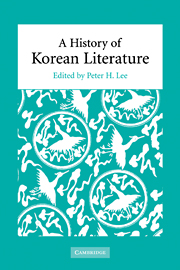Book contents
- Frontmatter
- Contents
- List of illustrations
- List of contributors
- Preface
- Note on the text
- Korean dynasties
- Glossary
- East Asia
- Principal places in works discussed
- Introduction
- 1 Language, forms, prosody, and themes
- 2 From oral to written literature
- 3 Hyangga
- 4 Silla writings in Chinese
- 5 Koryŏ songs
- 6 Koryŏ writings in Chinese
- 7 Early Chosŏn eulogies
- 8 Early Chosŏn sijo
- 9 Early Chosŏn kasa
- 10 Late Chosŏn sijo
- 11 Late Chosŏn kasa
- 12 Chosŏn poetry in Chinese
- 13 Chosŏn fiction in Chinese
- 14 Chosŏn fiction in Korean
- 15 P'ansori
- 16 Folk drama
- 17 Literary criticism
- 18 Early twentieth-century poetry
- 19 Early twentieth-century fiction by men
- 20 Early twentieth-century fiction by women
- 21 Late twentieth-century poetry by men
- 22 Late twentieth-century poetry by women
- 23 Late twentieth-century fiction by men
- 24 Late twentieth-century fiction by women
- 25 Literature of North Korea
- Bibliography
- Suggestions for further reading
- Index
24 - Late twentieth-century fiction by women
Published online by Cambridge University Press: 22 September 2009
- Frontmatter
- Contents
- List of illustrations
- List of contributors
- Preface
- Note on the text
- Korean dynasties
- Glossary
- East Asia
- Principal places in works discussed
- Introduction
- 1 Language, forms, prosody, and themes
- 2 From oral to written literature
- 3 Hyangga
- 4 Silla writings in Chinese
- 5 Koryŏ songs
- 6 Koryŏ writings in Chinese
- 7 Early Chosŏn eulogies
- 8 Early Chosŏn sijo
- 9 Early Chosŏn kasa
- 10 Late Chosŏn sijo
- 11 Late Chosŏn kasa
- 12 Chosŏn poetry in Chinese
- 13 Chosŏn fiction in Chinese
- 14 Chosŏn fiction in Korean
- 15 P'ansori
- 16 Folk drama
- 17 Literary criticism
- 18 Early twentieth-century poetry
- 19 Early twentieth-century fiction by men
- 20 Early twentieth-century fiction by women
- 21 Late twentieth-century poetry by men
- 22 Late twentieth-century poetry by women
- 23 Late twentieth-century fiction by men
- 24 Late twentieth-century fiction by women
- 25 Literature of North Korea
- Bibliography
- Suggestions for further reading
- Index
Summary
It has been said that liberation crept up on the Korean people like a thief. Then the Korean War hit before the nation had time to establish itself. Ideologies completely filled the interval of liberation, and before political discourse could achieve much depth, Korea moved into a divided era. Accordingly, there was no other choice but a division into North and South Korean literature. Out of the chaotic circumstances of the postwar days that followed the short space of liberation, women's fiction nourished itself on the barren postwar landscape and the destitution bequeathed by the period of colonization. It was the women who, amidst the harsh reality of a Korea divided and reduced to ruins, were charged with the duty to live on, both in the home and in society, at a time when men had either been wounded or simply disappeared.
LIBERATION AND THE KOREAN WAR: FICTION OF THE 1950S AND 1960S
For Korean women writers, the ideological struggles that arose after the liberation, as well as the complex political situation that surrounded the struggle to establish the nation, emerged as sensitive subjects. Mainly active before the liberation, writers like Pak Hwasŏng (1904–1988), Ch'oe Chŏnghŭi (1912–1990), Kim Malbong (1901–1961), and Chi Haryŏn began to write about the social problems of a transformed reality. One example is Kim Malbong's Hwaryŏhan chiok (A Splendid Hell), which was published serially in Puin sinbo (Women's News) starting in 1946–the first work to deal directly with women's movements.
- Type
- Chapter
- Information
- A History of Korean Literature , pp. 481 - 496Publisher: Cambridge University PressPrint publication year: 2003



